Arts & Entertainment
Nonbinary physician fights COVID-19 without legal protections
LGBTQ healthcare workers are stepping up, saving lives
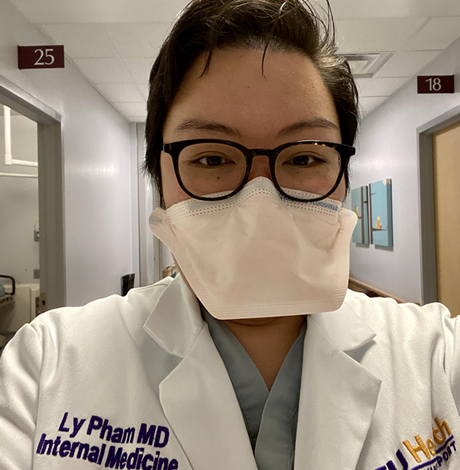
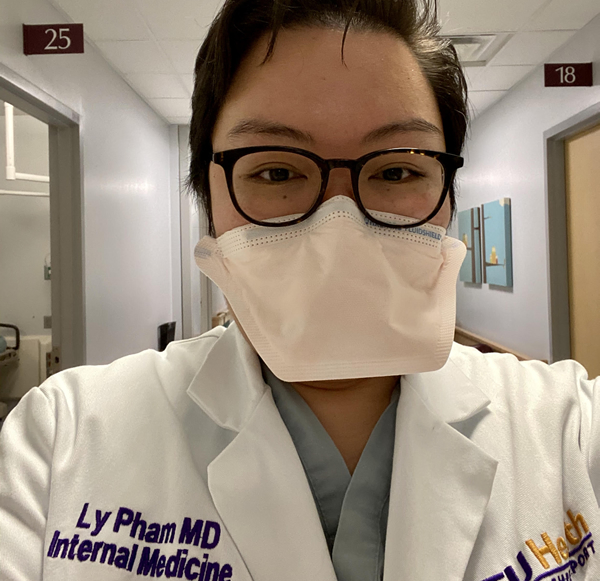
Dr. Scott Nass and Dr. Ly Pham are LGBTQ physicians on the front lines of the pandemic fight, but only one is protected from workplace discrimination. While Nass is fortunate to be a gay cisgender man practicing in California, Pham is a queer nonbinary doctor working in Louisiana without legal protections.
“Shreveport is a level one trauma center similar to Baltimore,” said Pham who uses singular they pronouns. “The hospital was fairly busy before COVID [but the pandemic] added another layer of stress and anxiety.”
Adding to Pham’s stress is the feeling that LGBTQ people are tolerated but not fully accepted into the larger Shreveport community. While HRC reports both Shreveport and New Orleans ban discrimination on the basis of sexual orientation and gender identity, Louisiana has had a tumultuous history with attempts to mandate a statewide ban.
“I get misgendered all the time,” Pham said before describing a usual day when they arrive at the hospital around 8 a.m. “Mostly by patients coming in and some coworkers. But I’m here to treat the patients and not educate them because they’re in a crisis right now and need to be treated and admitted to the hospital.”
Pham says they allow their patients to interact with them in a way that is emotionally damaging because they feel harms need to be triaged during a crisis. Louisiana governors have sought remedies to this preventable situation.
However, in 2018 the Louisiana Supreme Court struck down Gov. John Bel Edwards’ (D) executive order protecting LGBTQ state employees and contractors from workplace discrimination, according to a report by The Advocate.
The resulting tally from Freedom for All Americans shows Louisiana is one of 28 states where an LGBTQ worker, including essential medical personnel during a global health crisis, can legally be fired or face other negative action on the basis of sexual orientation or gender identity.
“The case of healthcare workers helps illustrate why it is in everyone’s interest that people are able to work regardless of factors that have nothing to do with their ability to do the job,” said Jon Davidson, Freedom for All Americans Chief Counsel. He is also an LGBTQ attorney who attended the Supreme Court arguments on this issue. “I hope the court sees this is not just important to the employees affected, but for society as a whole.”
But not every state will be equally impacted by the ruling.
Davidson explains a Supreme Court ruling on the Bostock v. Clayton County, Altitude Express v. Zarda and Harris Funeral Homes v. EEOC cases determining if Title VII protections “on the basis of sex” includes sexual orientation and gender identity won’t affect the 22 states that already have LGBTQ-inclusive nondiscrimination protections.
In April, Virginia Gov. Ralph Northam signed into law the Virginia Values Act, expanding nondiscrimination protections in his state to include sexual orientation and gender identity and making it the first state in the South with such inclusions.
“We need every healthcare worker possible saving lives,” Davidson emphasized. “So having protections is both important to keep qualified people in their jobs and it is also important that LGBTQ workers not be worried about who might learn they are LGBTQ. If you have to hide your partner [or who you are] because you’re afraid your employer might find out and you might be fired, that’s unacceptable.”
He added it was “just outrageous and cruel” for healthcare workers to endure such uncertainty during a crisis.
HRC, the Movement Advancement Project and other national policy trackers have noted California, where Dr. Nass encountered the initial waves of the deadly virus, has passed a series of increasingly inclusive statewide measures over the years. Their legislative efforts culminated in the recent Gender Nondiscrimination Act in 2011.
As a result, though Nass also finds the pressures of the pandemic to be “incredibly stressful,” he has not faced the added stress of having to conceal his orientation.
“When I’m not working, I am sheltering in place at home with my husband,” Nass said. “A police officer in Los Angeles who is also on the front lines of the pandemic.”
While their lives are at risk, their jobs and identities are not. However, the situation is very different outside of California.
Pham currently shelters-in-place with their fiancee, who uses both female and nonbinary pronouns and identifies as queer in orientation. The couple bought a two-person hammock so they can lie together under the trees and daydream about a future when they can travel. They are also planning their wedding and an eventual move to Los Angeles.
“It’s spring,” Pham said. “And we are appreciating nature and the flowers blooming and a time to slow down.”
But the rest period doesn’t last long for the physician who graduated in the midst of a global crisis. Pham has been out as an LGBTQ person since attending medical school at the University of Texas in San Antonio. Although Texas is another state without LGBTQ-inclusive workplace protections, Pham was able to find mentors who helped them through their personal journey from self-described butch lesbian to nonbinary as well as through their professional journey from student to physician.
Pham details the rest of their current daily routine with almost machine-like precision.
“I park in a parking lot that is gated using my badge,” Pham said. “There I put on my surgical mask that I have in my car. Parking is in the back of the hospital. I walk to the front. There is only one entrance to the hospital. I try to keep six feet from anyone else and I try to see if anyone else is walking toward the entrance.”
“Everyone feels a little more distant than usual,” agrees Nass in less constrained cadence when discussing his own routine, which begins at 6:30 a.m. “And I’ve worked on speaking more with my eyes now that no one can see me smile under the constant masks.”
Pham is a little more reserved beneath their mask as workplace interactions usually lead to misgendering without reasonable recourse, especially during the crisis.
They arrive at a screening station where they answer a hospital worker’s questions and get their temperature checked. When they pass the checkpoint, they get a sticker on their badge.
“Different colors for different days,” Pham explains. “Before I even get to my office, I usually swing by the ground floor and pick up my N95 mask and face shield, if I’m seeing COVID patients.”
But Pham admits it’s hard to know which patients are COVID positive, so they wear an N95 mask whenever they see patients. They also wipe down their keyboard, desk, chair, mouse, phone — everything in their work area.
Nass may be fortunate when it comes to workplace protections, but his personal equipment seems a little less protective than Pham’s, who works in a larger hospital and more closely with COVID patients.
“I stop at the front desk of the hospital to get an ear-loop mask,” Nass explains. “Not the most protective kind, but those are kept even more securely in particular patient areas.”
Nass notes “on administrative days” he doesn’t usually see much of anyone as access into the office space has been limited to reduce the risk of spreading the virus.
“I am not assigned to take care of confirmed COVID-19 patients in one of the two units we’ve designated for that,” he said. “But we have started to treat every patient, and each other, as though we may be carrying the virus.”
And this may be sound advice, though reminiscent of the early stages of the HIV/AIDS epidemic. In March, when PPE distributions were no match for the steady influx of patients in New York City, Kious Kelly, a gay nurse working at Mount Sinai hospital, contracted COVID-19 and died from it.
Kelly’s sister, Marya Patrice Sherron, told BuzzFeed News of a homophobic comment posted to a GoFundMe page set up to help with funeral expenses.
“It was a very, very, very hateful and insensitive comment suggesting that [his death] didn’t matter because he was a gay male.”
Pham faces similar insensitivity from nonbinary erasure even as they struggle to save lives during the crisis.
Pham’s hospital has a dedicated COVID team where they work when they are on call. Pham said in the beginning stages of the crisis it took a week to get test results back so they weren’t certain who was infected and who wasn’t. Now, with better testing, the turnaround has been 24 hours or less.
“We know definitively if they are positive or negative faster, instead of just suspecting that they are,” Pham said. “It helps us triage better.”
Pham also said this is safer for the medical staff since many of the infected are asymptomatic. As a result, everyone is tested regardless of symptoms.
“We stress the importance of social distancing because you don’t know who could test COVID positive and they could be spreading it around unknowingly,” Pham said.
At the end of their shift, Pham removes their gear by following the guidance of a hospital instructional video. They then wipe down their shield with hospital-grade wipes and they toss the mask if it has been visibly soiled.
After cleaning themselves and their workstation again, they wear a surgical mask down to their car. They then clean themselves and the interior of their car with alcohol again. When they get home, they keep a six feet distance from their fiancee and toss their clothes into the washing machine before jumping into the shower.
When it is safe, the two of them can finally relax together and reconnect by cooking, watching Netflix or daydreaming in their shared hammock.
Nass similarly ends his day with a trip to the washing machine and shower before collapsing on the couch with his husband and Boston Terrier. In the hour or two before he falls asleep he catches up on “The Magicians” or “Schitt’s Creek.”
“Sometimes I eat dinner,” he said in a rare consideration of his own health.
“LGBTQ healthcare workers are stepping up to save lives in this crisis,” said Hector Vargas, the executive director of GLMA: Health Professionals Advancing LGBTQ Equality, an LGBTQ medical professionals advocacy organization. “It’s long past time we step up for them to make sure they’re protected under the eyes of the law.”
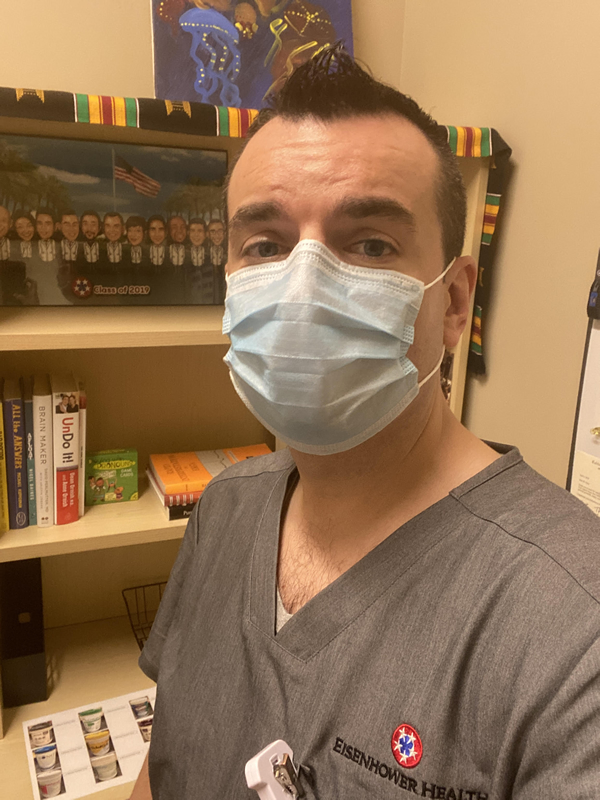
Theater
Ford’s ‘First Look’ festival showcases three new productions
A chance to enjoy historical dramas for free before they’re completed
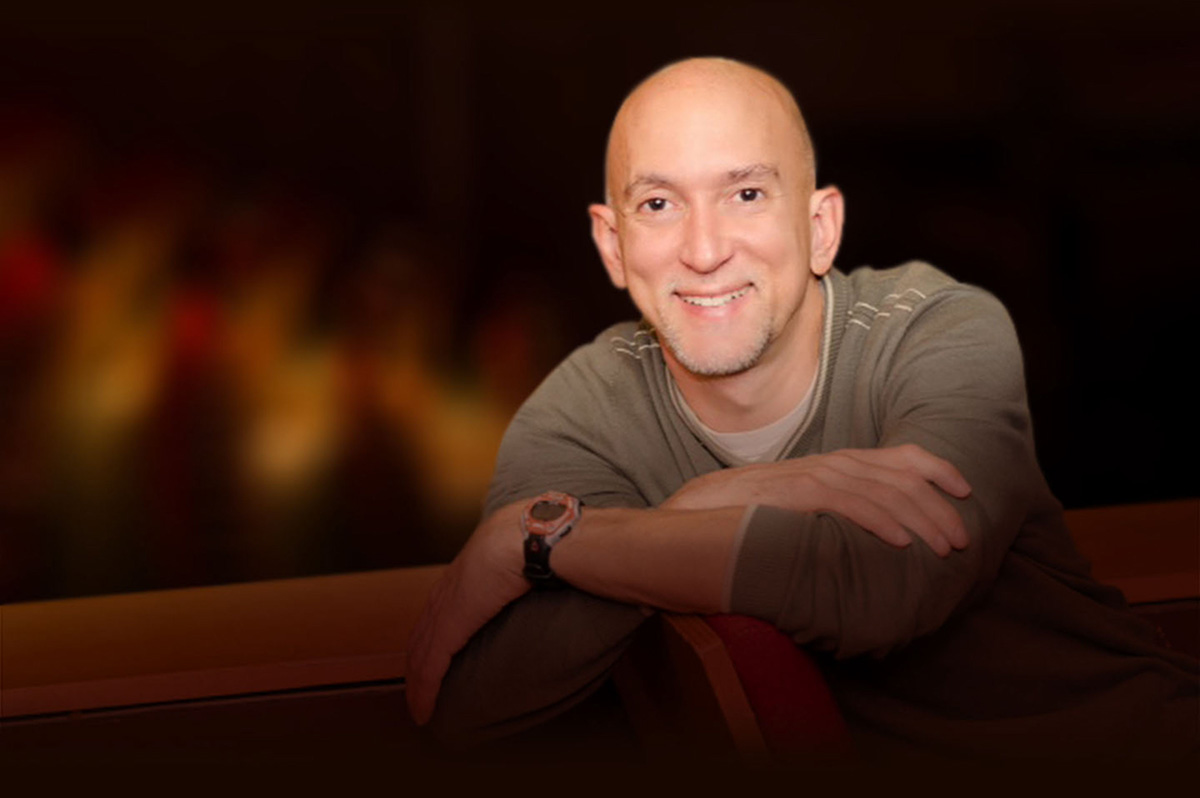
The Ford’s Theatre Legacy Commissions: A First Look – 2026
Jan. 16 & 17
Ford’s Theatre
511 Tenth St., N.W.
FREE
Fords.org
When Ford’s Theatre debuted its new plays festival, “A First Look,” in 2023, it was unclear whether people would come for the staged readings.
“Before the pandemic if you announced the reading of a play, 12 people might show up,” says José Carrasquillo, director of artistic programming at Ford’s Theatre. “Since then, we’ve experienced comparatively massive turnout. Maybe because it’s cheap, or because of the very newness of the works.”
This year’s fourth edition showcases readings of three pieces currently in varied stages of development. The free, two-day festival offers audiences a chance to encounter historical dramas long before they’re completed and fully produced. None are finished, nor have they been read publicly. And befitting the venue’s provenance, the works are steeped in history.
The festival kicks off with “Springs” by playwright Jeanne Sakata and directed by Jessica Kubzansky. Commissioned by The Ford’s Theatre Legacy Commissions, it’s the both epic and personal story of Sakata’s Japanese American family including her grandfather’s experience in an internment camp.
“Sakata’s immigrant grandfather was an exceptionally skilled farmer who helped to stave off starvation in the camp. Still, he never gave up on the idea that he belonged in America. It’s very much a story of today,” says Carrasquillo.
Unlike “Springs,” the festival’s two other works weren’t commissioned by Ford’s. But they both fit the history brief and likely will benefit from the exposure and workshopping.
“Providence Spring,” by California based playwright Richard Helesen and directed by Holly Twyford, portrays Clara Barton (played by local favorite Erin Weaver) as a hero beyond the Red Cross whose then-radical initiatives included cataloguing the Civil War dead, many pulled from mass graves.
Directed by Reginald L. Douglas, “Young John Lewis: Prodigy of Protest” explores a slice from the life of the legendary civil rights activist and longtime congressman. With book and lyrics by Psalmayene 24 and music by Kokayi this collaboratively staged reading between Ford’s and Mosaic Theater is slated to premiere fully produced at Mosaic as a 90-minute musical in the spring of 2026.
“When I was hired at Ford’s in 2018, we began discussing hiring writers who do historical drama,” says Carrasquillo. “Our intention was resolute, but we didn’t do it right away. It took getting through the pandemic to revisit the idea.”
At the same time, the racial reckoning spurred Ford’s to hire playwrights of color to tell stories that had previously been forgotten or ignored.
For Carrasquillo, who is gay, the impulse to commission was crystalized when he saw the film “Hidden Figures,” a true story about “three brilliant African-American women — at NASA during the Space Race, overcoming racial and gender discrimination to make crucial contributions to America’s spaceflight success.” He says, “the film floored me. How many stories like this are there that we don’t know about?”
One of the festival’s happiest experiences, he adds, was the commission of playwright Chess Jakobs’s “The American Five” and its subsequent success. It’s the story of Martin Luther King Jr. and his inner circle, including Bayard Rustin (MLK’s brilliant, unsung gay adviser) leading up to the 1963 March on Washington. The play later premiered fully produced in Ford’s 2025 season.
Increasingly, the readings at Ford’s have become popular with both artists and audiences.
At Ford’s, Carrasquillo wears many hats. In addition to selecting plays and organizing workshops, he serves as an in-house dramaturg for some of the nascent works. But he’s not alone. Also helming the festival are senior artistic advisor Sheldon Epps, and The Ford’s Theatre Legacy Commissions advisor Sydné Mahone.
Because the plays are in development, comments from directors, dramaturgs, and the audience are considered and may become part of the playwrights’ rewrites and changes. If and when the play resurfaces fully produced, audience members might find their suggestion in the completed work.
Is this year’s festival queer influenced? Yes, both by those involved and the topics explored.
Carrasquillo explains, “While Sakata’s “Springs” is primarily about immigration, its message is relevant to the queer community. Civil rights are being taken away from us. We need this playwright’s story to know what has happened and what can happen to any of us.
“Many of Ford’s legacy commissions underscore the importance of civil rights in our country and that’s important to all of us. Queer and not queer.”
Bars & Parties
Mid-Atlantic Leather kicks off this week
Parties, contests, vendor expo and more planned for annual gathering
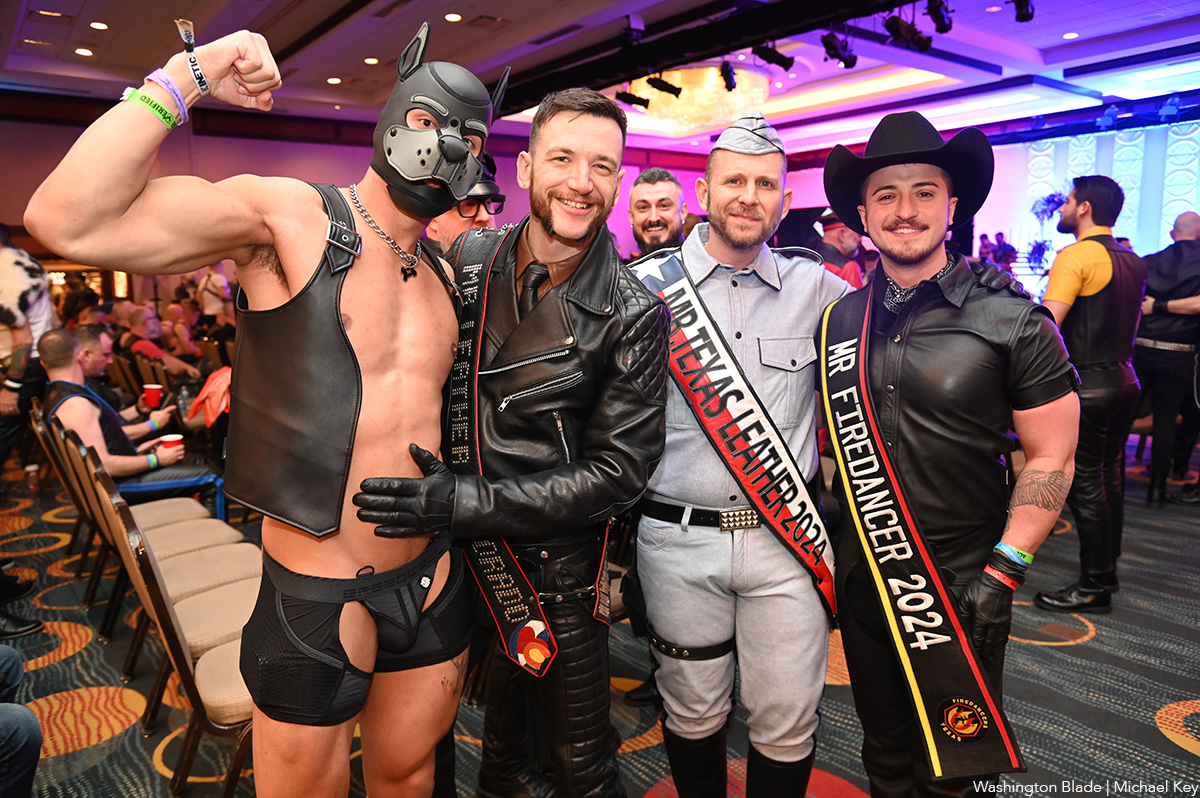
The Mid-Atlantic Leather Weekend will begin on Thursday, Jan 15.
This is an annual three-day event in Washington, D.C., for the leather, kink, and LGBTQ+ communities, featuring parties, vendors, and contests.
There will be an opening night event hosted the evening of Thursday, Jan. 15. Full package and three-day pass pickup will take place at 5:30 p.m. at Hyatt Capitol B. There will also be “Kinetic Dance Party” at 10 p.m. at District Eagle.
For more details, visit MAL’s website.
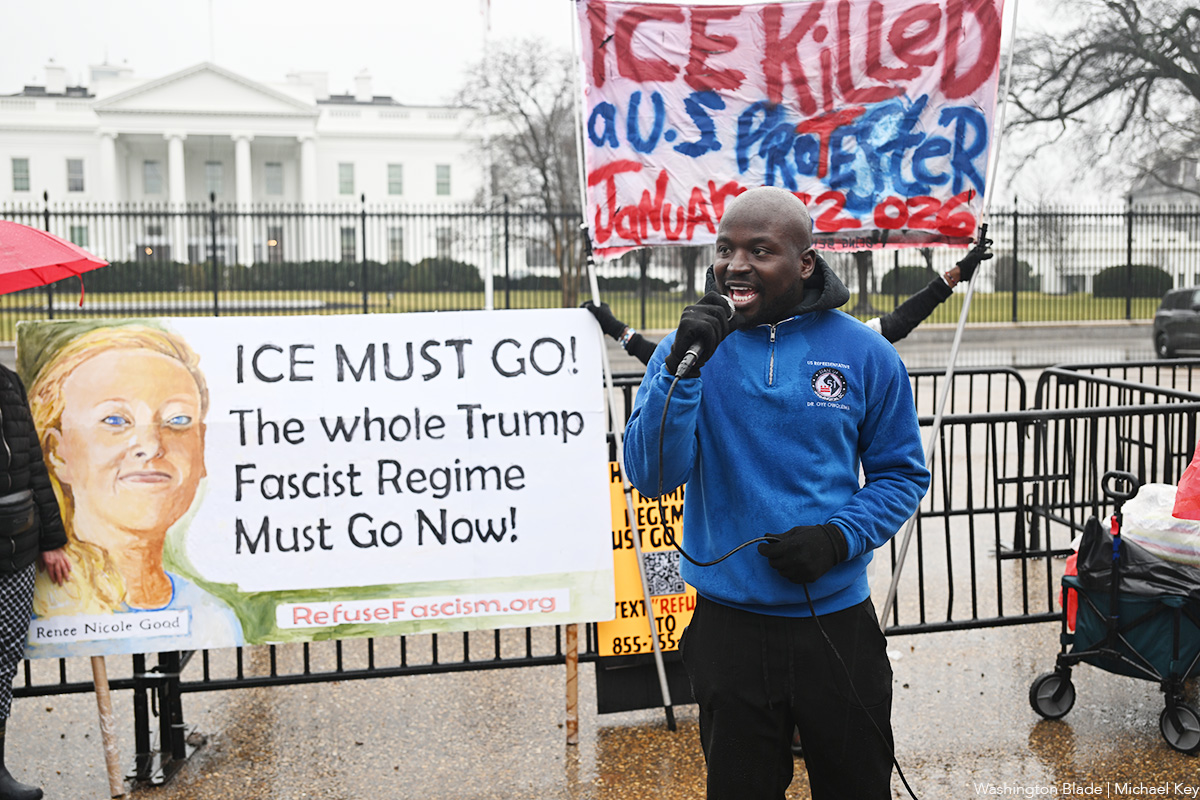
A protest was held outside of the White House on Saturday following the killing of Renee Nicole Good by a U.S. Immigration and Customs Enforcement agent in Minneapolis. Across the Potomac, picketers held signs calling for “Justice for Renee” in Tysons, Va.
“ICE Out For Good” demonstrations were held in cities and towns across the country, according to multiple reports. A march was held yesterday in Washington, D.C., as the Blade reported. Further demonstrations are planned for tomorrow.
(Washington Blade photos by Michael Key)
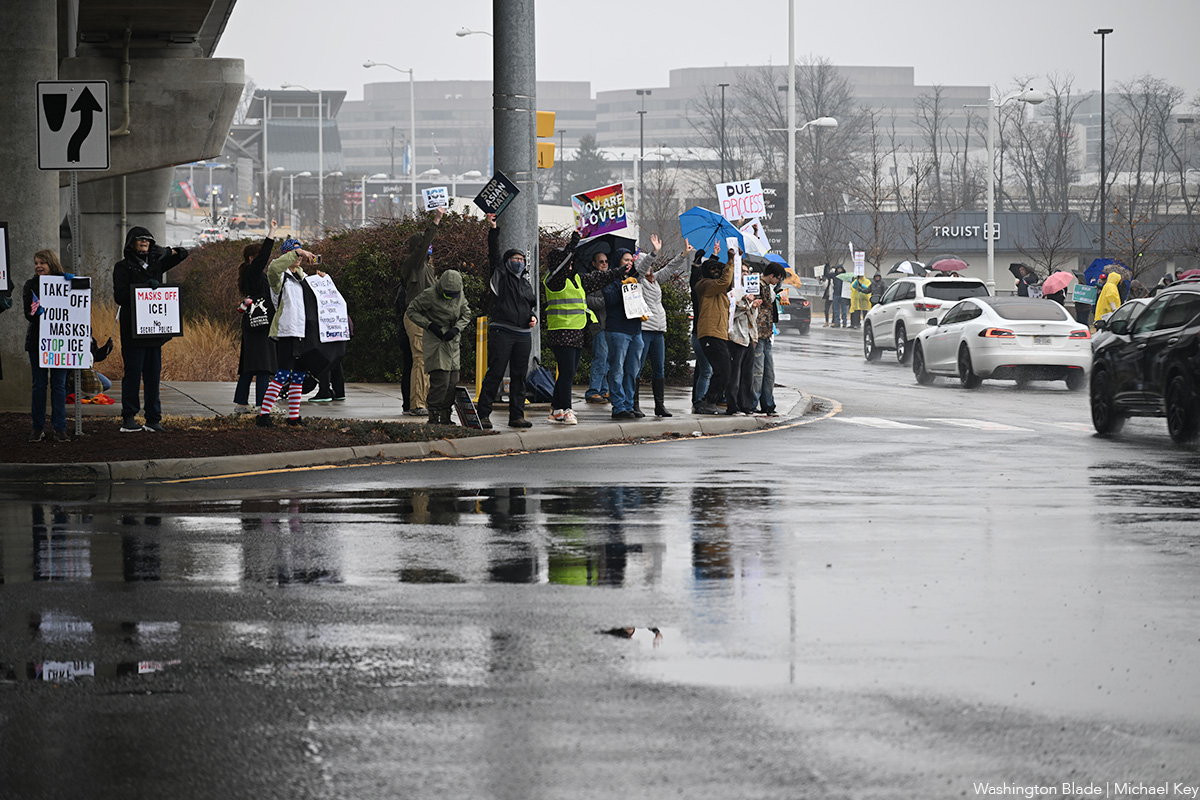
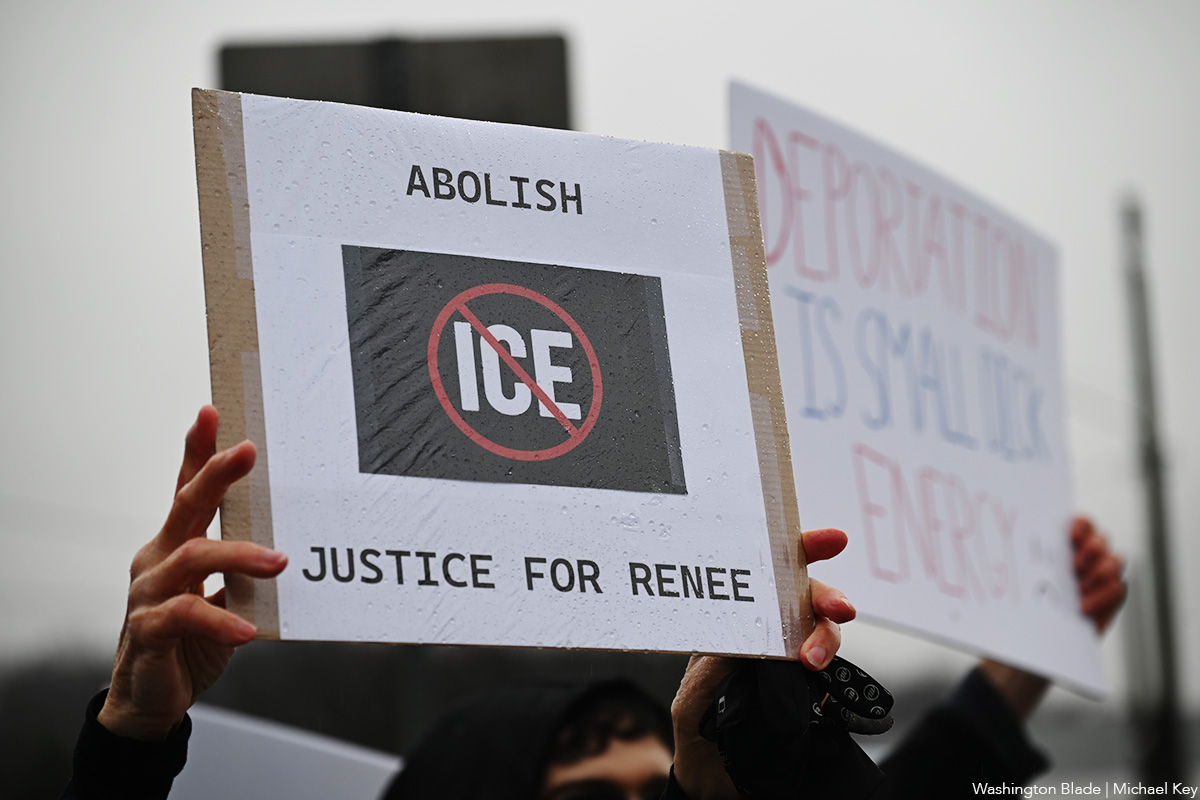
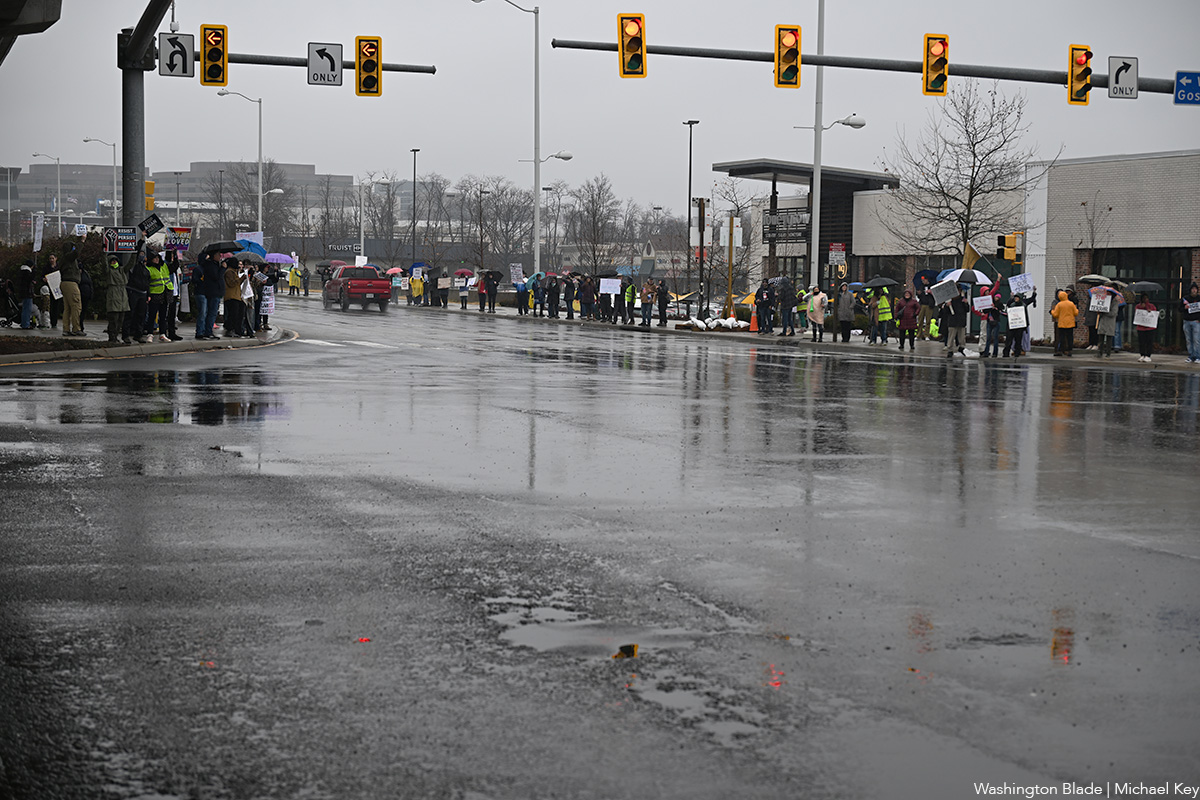
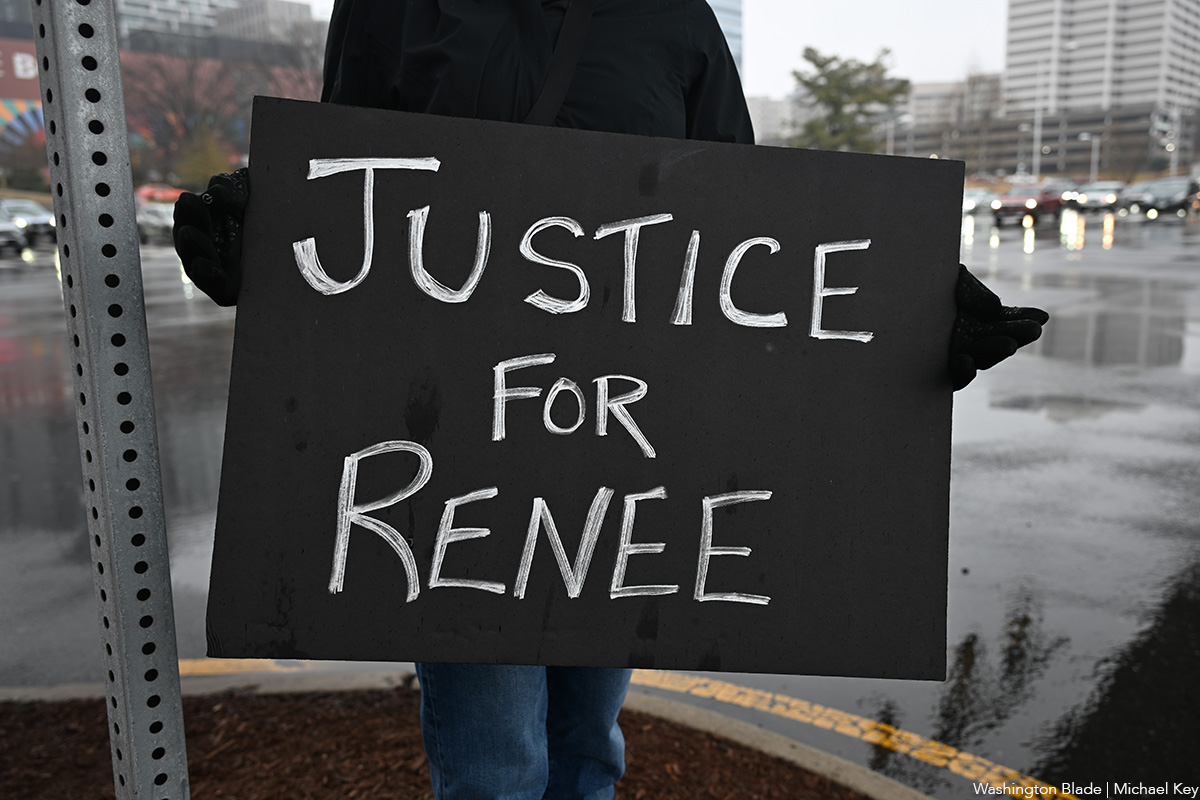

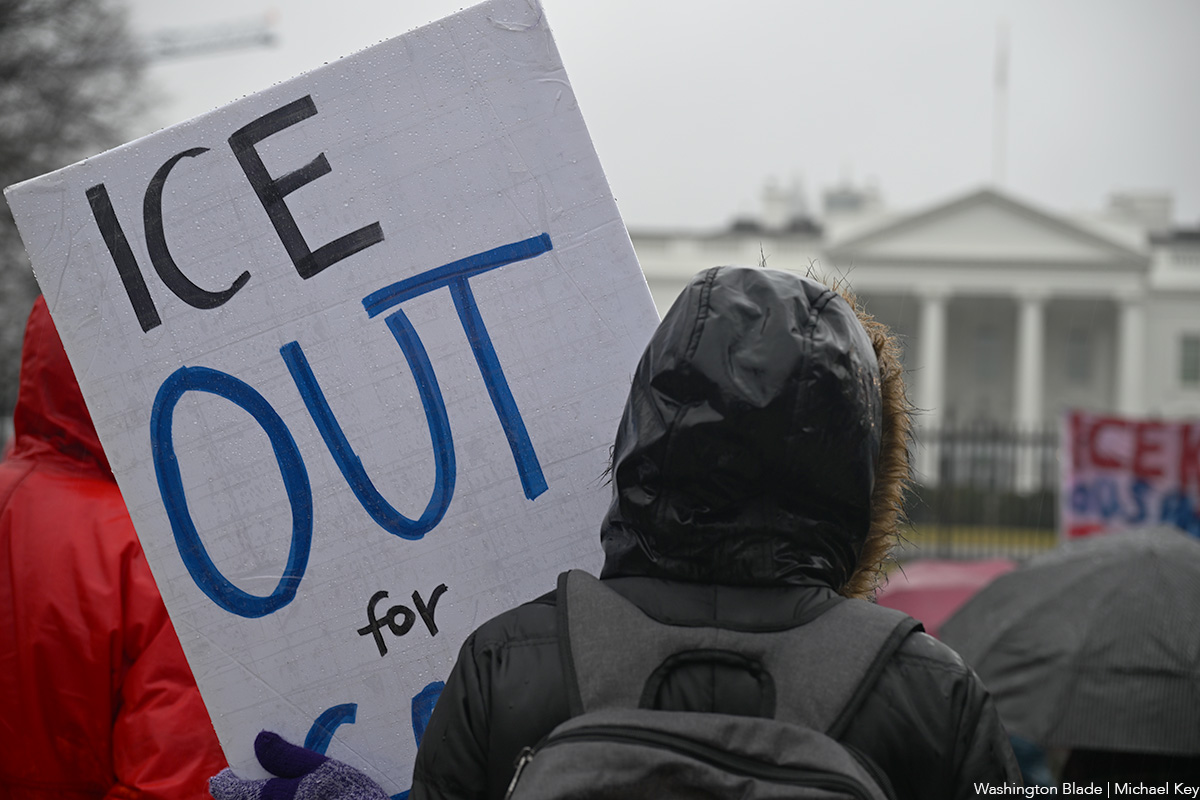
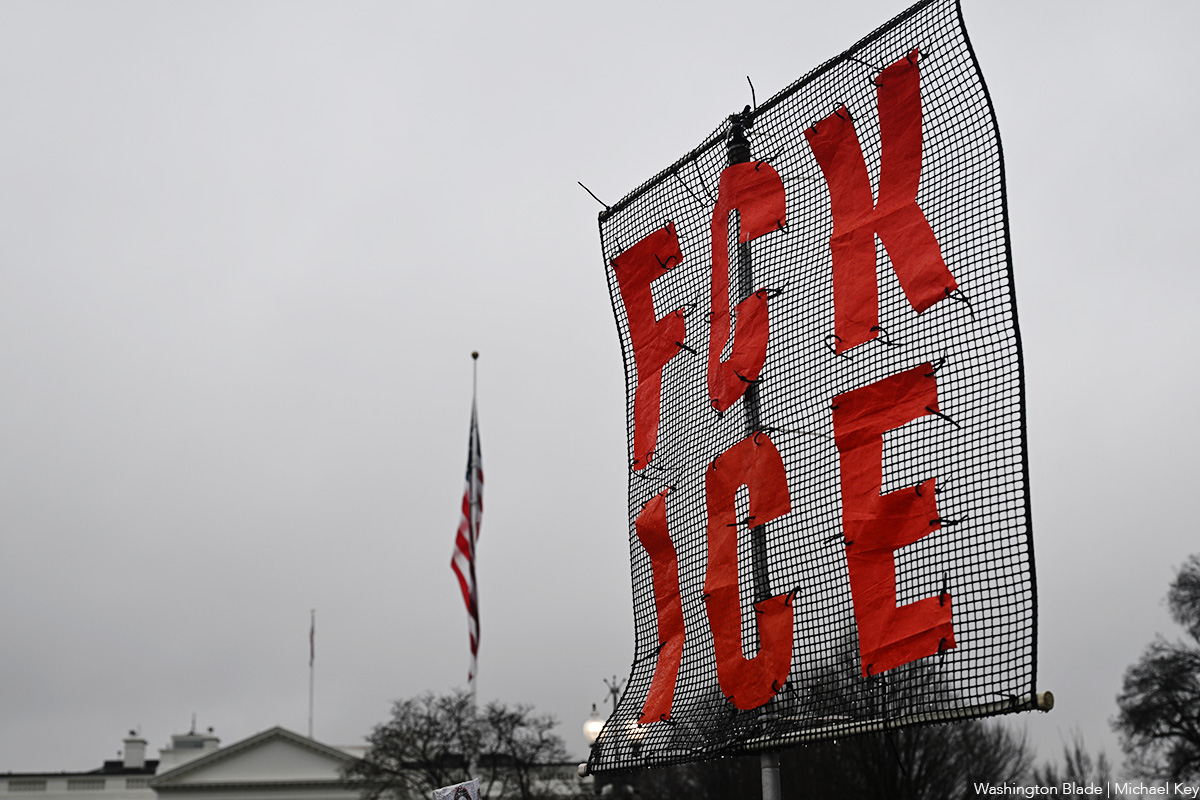
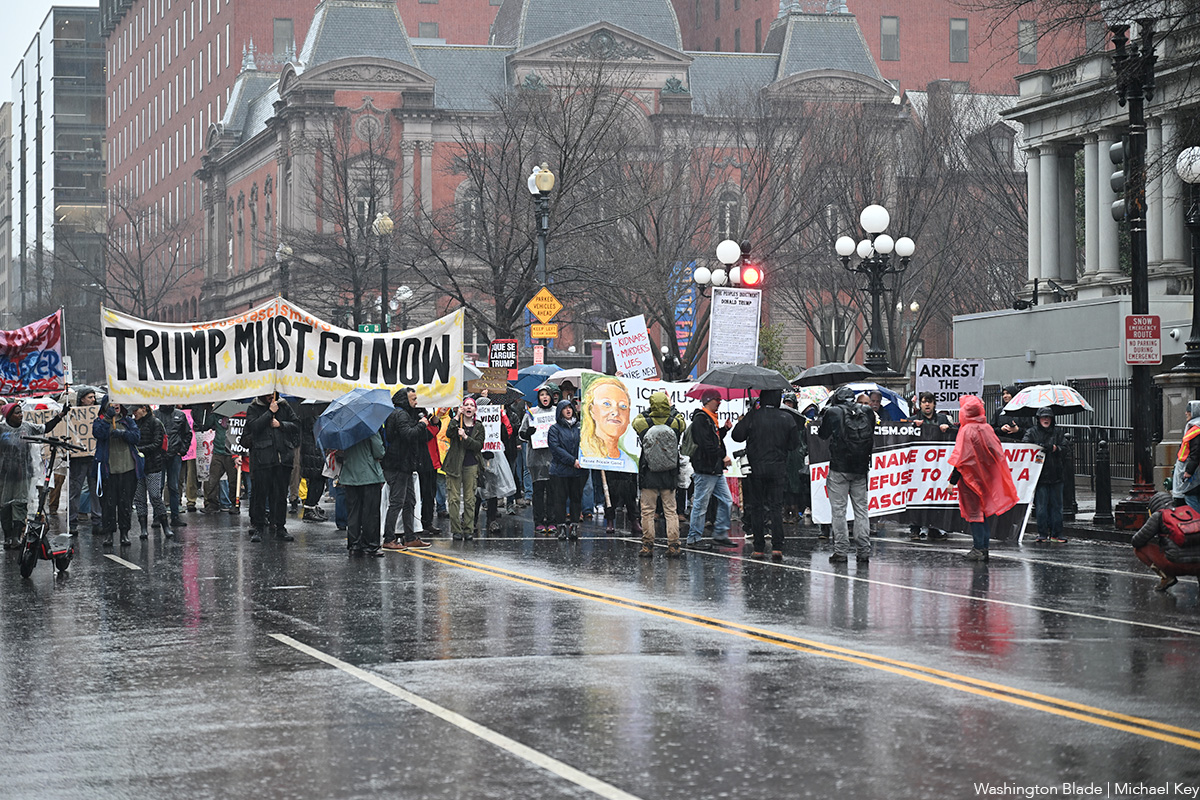

-

 Colombia5 days ago
Colombia5 days agoGay Venezuelan man who fled to Colombia uncertain about homeland’s future
-

 Arts & Entertainment5 days ago
Arts & Entertainment5 days ago2026 Most Eligible LGBTQ Singles nominations
-

 District of Columbia4 days ago
District of Columbia4 days agoKennedy Center renaming triggers backlash
-

 District of Columbia5 days ago
District of Columbia5 days agoNew interim D.C. police chief played lead role in security for WorldPride




















